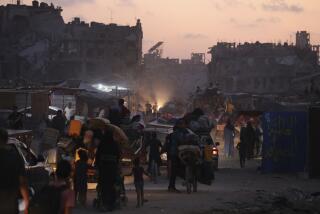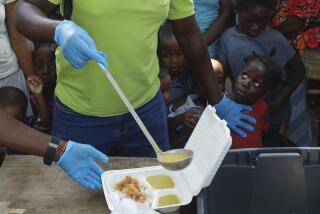Fivefold increase reported in tally of displaced Iraqis
- Share via
BAGHDAD — Iraq’s displaced population has grown to 2.3 million people, the Iraqi Red Crescent Society said Monday on the heels of a warning by another humanitarian aid group that border tensions are exacerbating the plight of those who fled north to escape sectarian violence.
The Red Crescent report says an additional 67,000 families left their homes in September, continuing a pattern that has multiplied the number of displaced people more than fivefold this year.
About two-thirds of the total are younger than 12, the Red Crescent said.
In a related report, the International Organization for Migration said shelling of Kurdish separatists in northern Iraq along the Turkish and Iranian borders had driven refugees into nearby cities, driving up rents and leading to evictions and an increase in forced prostitution, the report says. The Swiss-based migration group distributed the report Monday after a briefing on it in Switzerland last week.
About 1,000 families, mostly Christians and Sunni Muslims, fled the border with Iran as a result of bombardments that ended last month, said Dana Graber Ladek, the migration group’s Iraq displacement specialist. As many as half have returned, Graber Ladek said.
A smaller number have fled the border with Turkey, but a threatened cross-border Turkish offensive against the Kurdistan Workers Party, or PKK, could cause an additional 2,000 to 10,000 families to leave, the migration organization said.
Fewer than 1% of the displaced occupy tent camps, the group said. About 58% are in rented housing, 18% with relatives and 24% in public housing, the migration agency reported.
The displaced cause a severe drain on public resources and face hardships such as unemployment, poor medical care and inadequate schooling. This week Iraq’s parliament voted to give a monthly stipend equivalent to $120 to each displaced family.
Abdul-Samad Rahman Sultan, Iraq’s minister of displacement and migration, disputed the Red Crescent figure, saying the number relied on food basket registrations as an indicator of displacement. Not all families that change their food basket addresses are displaced, he said.
However, the Red Crescent figure was in line with an estimate published last week by the International Organization for Migration, which set the number at 2.25 million. An additional 2 million people are believed to have left the country.
Despite the continuing upward trend, the September numbers may mask the beginning of a reversal, migration monitors said. Displaced people get added to the total only when identified, but may have already been long displaced, Graber Ladek said.
Also, with the drop in violence attributed in part to the U.S. troop buildup, some families are returning home. The ministry reported Saturday that 3,000 families who abandoned their homes in the capital because of violence had returned over the last three months.
Iraqi Prime Minister Nouri Maliki took a surprise stroll down one of Baghdad’s once popular riverfront congregating spots Monday afternoon, tousling the hair of young soccer players and promising that the sectarian violence that has torn the country for more than a year was over.
Maliki had made similar comments Saturday night in a televised speech to the nation.
Despite his upbeat message, there were fresh reports Monday of more violence in the capital. A City Council member was gunned down, and the deputy prime minister reported the slaying of one of his guards.
Hamad Abdul Latif, 63, the council member from the Karada district of central Baghdad, was killed by armed men who ambushed his car, police said.
The media office of Deputy Prime Minister Salam Zikam Ali Zubaie reported that the security guard was kidnapped last Tuesday in the largely Shiite Bayaa neighborhood of southwest Baghdad and was found dead at Yarmouk Hospital two days later. He had been tortured and shot 10 times, the statement said.
In east Baghdad, gunmen killed Afi Ali Sultan, a director-general in the city government in the Ghadeer neighborhood, and a roadside bomb killed one person and injured four in the Baladiyat neighborhood, police in the Rusafa district said.
Two policemen were killed and seven injured when a roadside bomb struck a joint Iraqi police and army patrol in the Zafaraniya neighborhood of south Baghdad.
The bodies of three unidentified men killed by gunfire were found in the capital Monday, police reported.
--
ned.parker@latimes.com
Times staff writers Wail Alhafith, Saif Hameed, Saif Rasheed and Usama Redha and special correspondents in Baghdad, Basra, Kirkuk and Tikrit contributed to this report.
More to Read
Sign up for Essential California
The most important California stories and recommendations in your inbox every morning.
You may occasionally receive promotional content from the Los Angeles Times.














